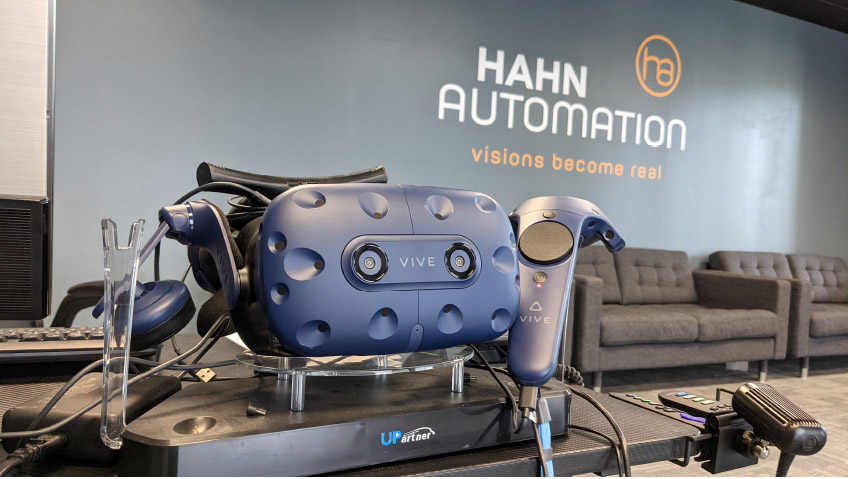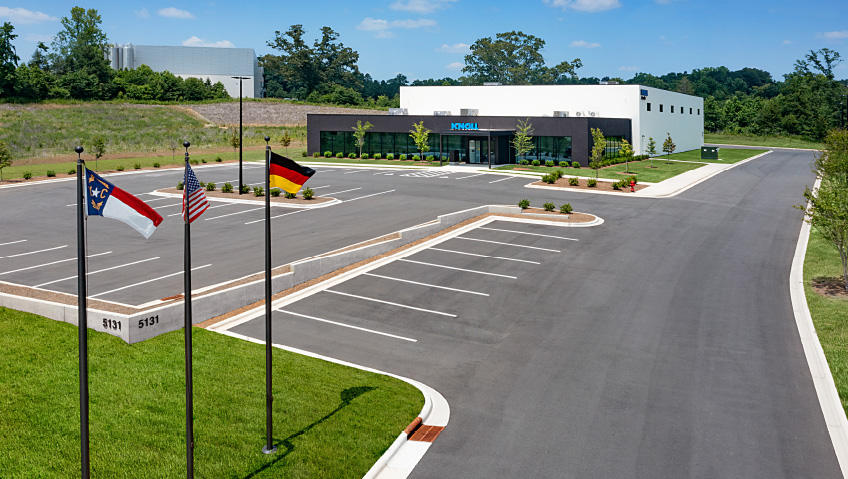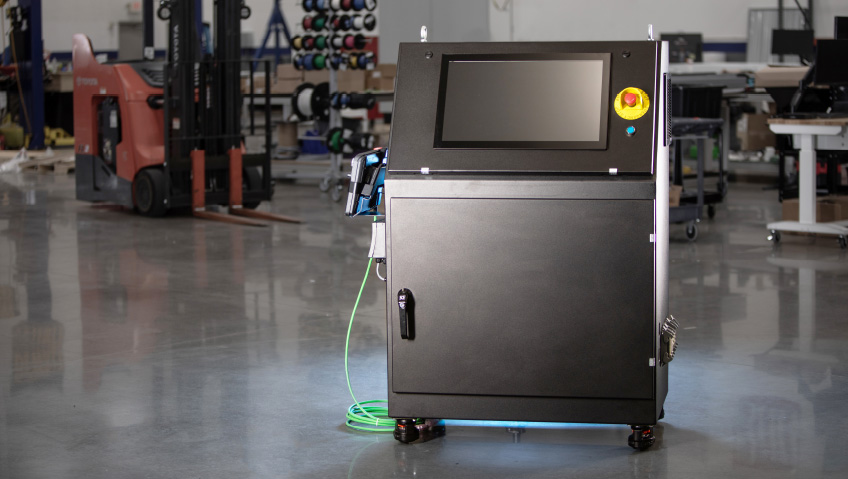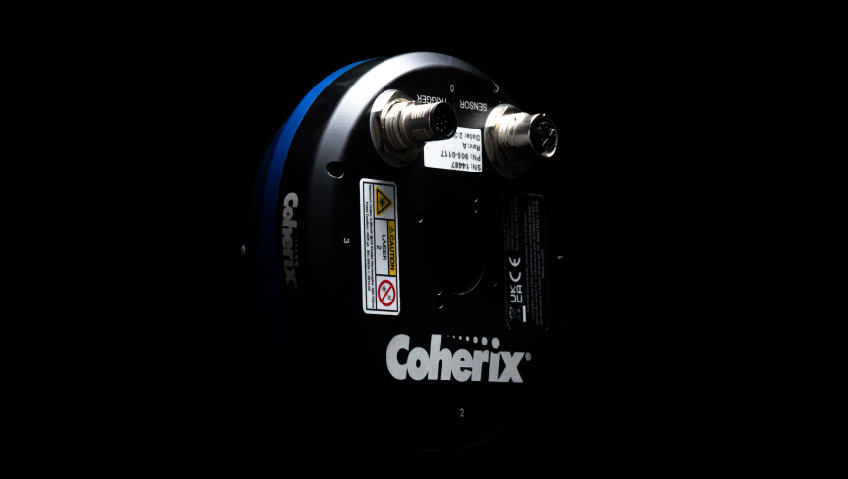For decades, Germany’s reputation as a world leader in engineering and technology has remained unshakable. The HAHN Group from Rheinböllen, Germany, has taken innovative industrial automation and robotics solutions to the U.S. and worldwide.
Steadily growing since it was founded in 1990, HAHN today has, besides its German and USA operations, strategic locations in the Czech Republic, Great Britain, Croatia, Austria, Mexico, Turkey, and other sites.
With many companies and brands under the umbrella including WEMO Automation, HAHN Robotics, Invotec, Rethink Robotics and REI Automation, the respected business has a powerful presence in the United States as HAHN Automation, Inc.
Located in Hebron, Kentucky, HAHN Automation was formed in the U.S. over 20 years ago, and continues to live by its motto, “German engineering made in America.”
Experts in automation, robotics and testing processes, HAHN Automation remains both a pioneer and a leader in the industry, continually expanding its services, and investing in technology and employees for the betterment of its many customers.
From HAHN to HAHN Group
Known globally for its work with clients in the automotive sector, the company decided to help stabilize and diversify the business, creating the HAHN Group about four years ago. As a holding company for HAHN Automation, which is a multi-site company, the move saw HAHN add medical and consumer goods to its roster.
These include sizable independent companies not under the HAHN Automation brand, and owned in their own right, such as Miamisburg, Ohio-based Invotec – which designs and manufactures automation solutions for medical device manufacturers producing test, inspection and assembly equipment – and REI Automation, Inc.
These companies, and others, keep their original names, and are supported by the HAHN Group. As an added benefit some, like Columbia South Carolina-headquartered REI, also cover a region that wasn’t as well supported before joining the Group.
Growth strategy
A shining example of the HAHN Group’s strategic growth strategy is REI Automation. REI (Reverse Engineering Inc.) was created in 1991 and owned by Paul Brown and Grant Phillips for the past 23 years.
“We bought a fledgling two-employee company when we were young,” says Grant Phillips, President of REI. Starting off with General Electric’s management training program and growing within the organization, Phillips later purchased REI. Expanding the business to almost 80 employees and $25 million in revenue, REI became an integral part of the HAHN Group on November 1, 2019. REI continues operating under its existing management.
REI focuses on five different industries: automotive work, medical products, electronics, the nuclear industry, and consumer goods – a sector seeing marked increases in the level of automation.
“Electronics, consumer groups, and medical products are three areas where we definitely focus on growth,” says Phillips of REI, which also has groups from Germany and Connecticut heavily involved with testing and vaccination products for administering COVID-19 vaccines.
“Growth has been organic, growing from within, as well as acquisitions. In the case of REI automation, we were a rapidly growing company when we became part of the HAHN Group a year and a half ago; in fact, in 2019 we were named one of the fastest-growing companies in the Inc. 5000 list. Now we are part of the Group.”
Still operating as an independent company under the REI name, Phillips is pleased with the acquisition, and the benefits for both REI and HAHN. “We are still agile and free-growing,” he says. “We have the resources and best practices to share with the Group companies. It’s a great strategy that is very different from anything else in the world.”
Philipp Unterhalt, Managing Director of HAHN Group, said in a media release at the time of the acquisition: “We found a passionate team with an impressive track record building the company in the past and ambitious plans to develop it further. We are ready to support REI Automation on its further journey and are delighted to have them on board.”
No time for idling
Never the kind of organization to stand still, the HAHN Group and its companies keep developing.
In 2015, the company created a new location in Queretaro, Mexico. The next year, it doubled its production capacity by investing in its Hebron facility. 2017 marked not only the 25th anniversary of its Rheinböllen location but also the Invotec acquisition.
In the years to follow, the company saw ORWIN and Multi Automation come under HAHN Automation along with REI, and HAHN Automation launching SmartSolutions, its “first own standard product on the market,” as it’s written in the company history.
Among the Group’s companies is HAHN Plastics. Formed in Connecticut in 2017, this division is active in many sectors, including assembled plastics parts and connectors for the automotive industry, the molding of medical devices including equipment and disposables, oral care, packaging, and more.
“They have really grown these past several years,” says Greg Earle, Managing Director, who has been at HAHN Automation since 2012.
Automotive automation
With the automotive sector still going strong, HAHN Automation is actively involved with its counterparts in Germany, supporting global customers like American multinational supplier BorgWarner, and Brose, the fourth-biggest automotive suppliers in family hands.
Since HAHN has locations worldwide, the company deploys and supports machines in the United States, Mexico, the Czech Republic, China and other sites.
Working through Tier 1 and Tier 2 suppliers, HAHN Automation builds equipment for world famous shock manufacturer Bilstein, which makes shocks for Tesla, one of the world’s biggest makers of Electric Vehicles (EVs).
Additionally, HAHN works with other Original Equipment Manufacturers (OEMs) producing parts for respected automakers like Volkswagen, Volvo, and BMW. “Most of the automation in car manufacturing is in building the components to go in cars for the final assembly of the vehicle,” says Phillips. “It’s a lot of hand assembly, and the automation is usually in the body-building.”
Although HAHN Automation is stepping up its efforts in the medical and consumer areas, it is also seeing growth in other areas of the changing automotive market, especially with the shift away from gas to electric-powered engines. This includes working with a company on the base-plate for the heat sink that seats rechargeable batteries.
Active in so many areas of automotive, HAHN Automotive remains highly competitive in traditional areas such as turbochargers, fuel consumption, and additional power extraction, but is also familiar with the present and future needs of electric vehicles.
And, in a similar way to the shift from gas-powered engines toward EVs, the company expects green energy will be an area of growth in the next five years.
The source of solutions
With many decades of combined experience, HAHN knows the ins-and-outs of automation.
By working closely with clients who usually come bearing drawings and specifications, HAHN Automation proposes the best solutions for assembling the product. “We are experts at knowing what to do first, second, third, and what are the best transfer mechanisms and best processes for putting products together,” says Phillips.
“Customers come to us with a product design, and we typically develop the assembly line for putting the products together. The final assembly line is built as a project – that’s what we do.” Sometimes, when there are unique or difficult processes, HAHN works with the client on prototyping.
To provide their customers with the best, most informed processes, the HAHN Digital group created EVE Vision.
Experts in the digitization of manufacturing companies and combining digitization with automation and robotics, the group’s EVE Vision provide a viable, advance solution with which to address manual vision inspection challenges.
Used for augmented reality, these glasses allow experienced technicians to see inspections for themselves but from a distance, through the eyes of staff on site – who may be less qualified but who literally act as eyes, ears and hands.
“They wear these glasses, and we are able to see what they are seeing” says Earle. “And then, within the glasses on our computer, we can say, ‘Push this button,’ and circle it in their glasses, or say ’Type in this number here’ and display it, or send in the print or schematics.
“It lets them keep their hands free. Plus, it lets us see exactly what they are seeing so they don’t do things to wrong way.”
As an innovative technology that merges glasses from electronics company Epson with software from HAHN, EVE Vision has really taken off in the marketplace. Especially, according to the company, since the beginning of the COVID-19 pandemic over a year ago, since fewer people need to put themselves at risk.
Room for VR
To further support customers, HAHN Automation created a Virtual Reality (VR) room for design presentation and reviews. “It’s pretty cool,” says Earle. “The VR room gives customers the chance to see our machines and our products in a virtual environment so they can walk around the machine, check the heights, check the ergonomics, see parts move in a computerized virtual environment, and get a feel if this is where they want things – is this the right height? – and those kinds of things.”
Continuing to win awards for its work – including the Inc. 5000 fastest-growing companies in the U.S. for 2019 for REI, and Kentucky Manufacturing Company of the Year in 2015 for HAHN – the company plans to continue to innovate and expand to meet the needs of customers, now and in the future.
“We will continue to grow and cover a multitude of regions around the world, as well as touch every industry with factory automation solutions,” says Phillips.






